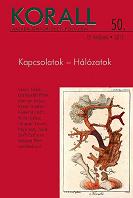Mihnea támogatói: Egy havasalföldi trónkövetelő kapcsolathálója Konstantinápolyban, 1654–1657
The supporters of Mihnea: The Social network of a Wallachian pretender in Constantinople, 1654–1657
Author(s): Gábor KármánSubject(s): History
Published by: KORALL Társadalomtörténeti Egyesület
Summary/Abstract: Throughout the early modern period, there was a constant presence of pretenders from the voievodates of Moldavia and Wallachia in Constantinople, who sought support in the Ottoman capital for gaining the thrones. The case of Mihnea, the alleged son of Voievod Mihnea Radu of Wallachia and Moldavia, himself voievod of Wallachia in 1658–1659, is singled out by the exceptionally detailed documentation that illustrates the network this pretender managed to maintain at the Sublime Porte. Thanks to the surviving Transylvanian correspondence and Mihnea’s excellent contacts with the principality’s embassy, a much deeper insight could be offered into the pretender’s activities and networks than what could have been written based exclusively upon the widely studied Venetian, French or Imperial diplomatic correspondence. The contacts of this Wallachian pretender can be regarded as exceptional, as he, like foreign embassies and some Ottoman politicians, had direct contact to the House of Osman, through the person of Atike Sultan, daughter of Sultan Ahmed I, and her husband, Doğanci Yusuf Pasha. The Transylvanian correspondence also revealed important details about the much more typical case of Vasile Lupu, as well as about phenomena which were not documented so far. One such phenomenon was the practice that ruling voievods tried to neutralize other pretenders with making them sign an oath, or even secure their political support in the Ottoman capital in exchange for a regular salary. From a comparative perspective, the case of Mihnea can illustrate that Moldavian and Wallachian rulers (and would-be voievods) were much more deeply integrated into the political hierarchies and decision-making circles of the Ottoman Empire than the princes of Transylvania.
Journal: Korall - Társadalomtörténeti folyóirat
- Issue Year: 2012
- Issue No: 50
- Page Range: 7-29
- Page Count: 23
- Language: Hungarian

